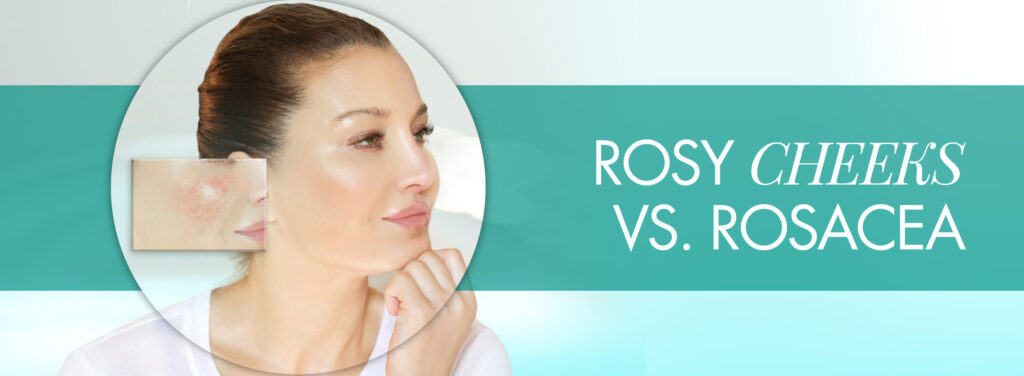Is it Rosy Cheeks, or is it Rosacea?

We all blush and get flushed sometimes—it’s normal. But if the blush on your cheeks is frequent, you might have a skin condition called rosacea. But how do you tell the difference between a healthy blush and a skin condition? In honor of April being Rosacea Awareness Month, we’re breaking it down below:
What is Blushing
Blushing is getting red-faced from shame, shyness, or embarrassment. It results from an emotional reaction that makes your glands release adrenaline. This hormone affects your nervous system, and blood is brought closer to the surface of your skin and your capillaries widen. But blushing is temporary.
What is Rosacea?
Rosacea, on the other hand, is a permanent skin condition. With rosacea, the blood vessels show through the skin enough that your face frequently looks red. This redness can come and go, depending on exposure to triggers. Although it is an incurable skin condition, the good news is that treatment options to help you are abundant once you’re diagnosed.
Diagnosing Rosacea
The providers at West Derm are trained to diagnose rosacea by examining your facial skin. They’re primarily looking for enlarged blood vessels. If you’re diagnosed with rosacea, you can do several things to manage your condition.
Reduce Rosacea Triggers
Rosacea triggers include hot weather, hot food, intense exercise, and menopause.
Avoiding Irritants
People with rosacea have sensitive skin that can also redden from irritants in some products. Everyday things like skincare and haircare can contain irritants that cause rosacea flare-ups. It’s helpful to avoid any product that makes your rosacea worse than it was before you used it and also get personalized product recommendations from your dermatologist.
Keep a Rosacea Diary
A rosacea diary can help you keep track of things that trigger your flare-ups. This information can help you remember to avoid these triggers in the future. You can also benefit from keeping track of products that affect your skin and identifying the irritating ingredients so you can avoid them.
Extra Sun Protection
People with rosacea need extra protection from the sun’s harsh UV rays, so remember to wear dermatologist recommended sunscreen daily.
Treatments for Rosacea
If your provider decides that you need rosacea treatment, there are many options, from prescription creams and gels to antibiotic pills and light and laser therapy.
Luckily, there are plenty of ways to manage rosacea like avoiding triggers, reducing irritants, keeping a rosacea diary, and ensuring extra sun protection. There are also many dermatological treatment options that your provider can help you with.
We provide Healthy Skin for LifeTM and our providers are rosacea experts. Contact us to schedule an appointment, and a knowledgeable provider will assess you for rosacea and, if you have it, can recommend treatment options.





